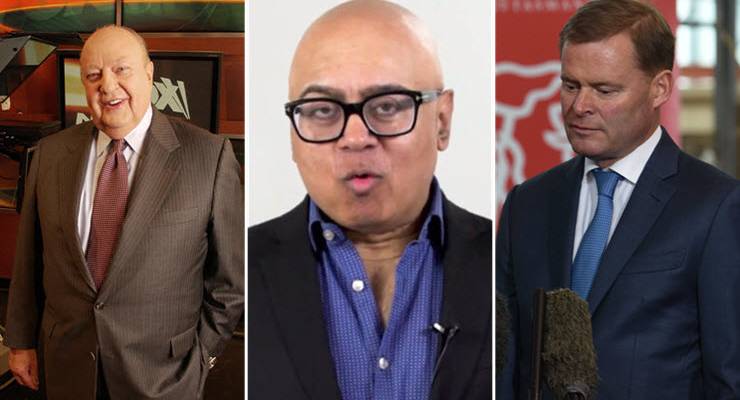
QBE’s chief executive Pat Regan has been sacked from his lucrative role after a female employee complained about receiving reportedly “unwanted messages” from him.
But instead of calling what unwanted messages sent from a senior male executive to a mid-level female executive is — sexual harassment — it simply called the allegations an issue of “workplace communications”.
Workplace communications … a leave of absence … unbecoming manner … a distraction. It’s startling the verbal gymnastics companies go through to avoid calling sexual harassment what it is.
It also hinders companies’ ability to make meaningful changes to address sexual harassment and gender discrimination.
Calling a spade a garden implement
A distraction: When Fox News Channel and Fox Business Network chairman Roger Ailes stepped down from his role in 2016, he issued a statement to Rupert Murdoch. Instead of addressing the litany of complaints against him, Ailes simply said: “I will not allow my presence to become a distraction from the work that must be done.”
Pursue other interests: In September last year, IFM’s executive director Frederic Michel-Verdier stepped down after a sexual harassment claim against him was settled for almost half a million dollars. Despite the victim, infrastructure analyst Nathalie Abildgaard, going public with her claim, the company simply said Michel-Verdier was leaving to “pursue personal business interests”.
Unbecoming manner: Former David Jones chief executive Mark McInnes, accused of harassing a junior publicist, stepped down from his role in 2010 after Kristy Fraser-Kirk took the case to the courts. In a letter to the board, McInnes said he behaved in a manner “unbecoming of the high standards expected of a chief executive officer toward a female staff member”. No mention of sexual harassment.
Stepping down, a modest breach: AMP’s CEO Alex Wade received a series of complaints about his conduct and was accused of sending explicit photos to female colleagues. The board gave him 24 hours to resign but made no references to his behaviour in a short statement about his departure. Wade merely stepped down from his role, effective immediately.
Similarly, a statement on Wade’s colleague Boe Pahari didn’t mention sexual harassment. Although Pahari’s comments and behaviour were deemed “unacceptable”, the company stood by his promotion in 2017. An investigation into the allegations conducted by UK QC Andrew Burns found Pahari’s behaviour was a “modest breach of AMP workplace behaviour and equal opportunity policy”.
Pahari was demoted to his old position running AMP Capital’s infrastructure equity business.
Ill health: Former Adelaide University vice-chancellor Peter Rathjen stepped down from his role earlier this year after allegations of sexual harassment. An email sent to staff and students said he resigned “due to ill health” — a university spokesperson said they couldn’t give more details at the time because of the Independent Commissioner Against Corruption (ICAC) secrecy rules.
The ICAC report found Rathjen’s conduct to be “sexual in nature”; the university avoided the terminology.
The university continues to avoid using the word sexual, saying Rathjen simply engaged in improper and serious misconduct and unacceptable behaviour.
While the media is generally pretty good at calling out sexual harassment, this doesn’t mean it’s always done in the best way: a weekend read on Rathjen in The Australian is equally problematic.
The piece frames the harassment in terms of Rathjen’s “demise”, first discussing how much alcohol the 56 year old had consumed the night he groped two colleagues, then discussing the “cost” it had on “his career, his health and reportedly his marriage”.
Only then does the piece turn to the effects on the women involved, and his pattern of misconduct.
Language matters
Australian Catholic University adjunct professor and lawyer Lisa Heap told Crikey language used by corporations was designed to protect their reputations — but in doing so downplayed the seriousness of the harassment.
“Unwillingness to name what the conduct is is a reputational management issue,” she said. “We all read between the lines, but by not using the term ‘sexual harassment’ they’re trying to suggest it’s not as serious as it is, or avoid negative community perceptions of what that might be.”
In the case of Pahari and Wade at AMP, it was clear the company was trying to downplay the issue from the start.
“Sexual harassment of any kind is serious, but when it is the most senior people perpetrating the harassment it has a particular impact in terms of culture. In some instances, the more senior you are the more serious it is,” Heap said
Monash University associate law professor Dominique Allen said organisations often avoid using the term “sexual harassment” to protect themselves from further action or legal action.
“If a company makes unsubstantiated allegations — allegations that haven’t been proven in court — it might expose the company to legal action,” she said.
The Australian and AMP did not respond to Crikey’s requests for comment.








Crikey is committed to hosting lively discussions. Help us keep the conversation useful, interesting and welcoming. We aim to publish comments quickly in the interest of promoting robust conversation, but we’re a small team and we deploy filters to protect against legal risk. Occasionally your comment may be held up while we review, but we’re working as fast as we can to keep the conversation rolling.
The Crikey comment section is members-only content. Please subscribe to leave a comment.
The Crikey comment section is members-only content. Please login to leave a comment.